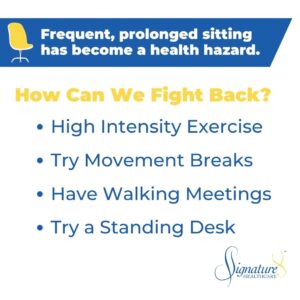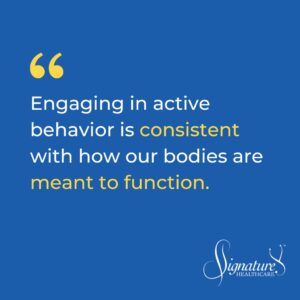To Avoid Sitting Disease, Get Moving!
Do you feel like you’re pretty active? Do you think you spend lots of time on your feet every day?
You may want to think again.
Studies show that, even with exercise, the average American spends only three hours a day outside their car, out of their chair, or off the sofa. Sitting in traffic, bingeing TV shows, and extended gaming are all contributing to “sitting disease.”
What Is Sitting Disease?
Sitting disease (a term coined about a decade ago) is prevalent in more developed nations where frequent, prolonged sitting has become a health hazard.
Sitting disease encompasses a cluster of symptoms and risks associated with overly sedentary behavior. Known collectively as metabolic syndrome, conditions range from obesity, unhealthy cholesterol levels, and high blood sugar to elevated blood pressure and the risk of death from cardiovascular disease and cancer.
Too much sitting also encourages back problems, loss of muscle tone, osteoporosis, and even varicose veins.
What’s considered prolonged sitting? It’s loosely defined, but generally:
- An individual who sits for less than four waking hours a day is considered “active.”
- One who sits for four to eight hours a day is considered “moderately active.”
- A person who sits for eight-plus hours a day — particularly eight consecutive hours — is considered “sedentary.”
How Does Too Much Sitting Affect Us?
Sitting is often called “the new smoking” because its effects on the body are equally dismal. Extended studies show the more we sit, the more likely we are to die from cardiometabolic diseases and certain cancers.
But can’t we just hit the gym after work or when the kids are in school and counteract all our sitting by working out for the recommended 150 minutes a week? Not likely.
In a meta-analysis of various studies averaging 50–100 patients each, researchers found even the currently recommended standards for exercise won’t undo the harmful effects of prolonged sitting.
There’s certainly an advantage to these workouts: Exercisers’ vital signs and functional capabilities are better than non-exercisers’. But the exercisers have the same mortality statistics as the sedentary — they die at the same age and at the same rate.
Something neurohormonal may be secreted from our blood vessels when we sit too long. As blood pools in the pelvic area and veins of the lower extremities, this secreted substance begins to negatively impact the cardiovascular system.
Some scientists believe frequent or extended sitting may alter the body’s reaction to insulin, the hormone that helps us get energy from carbs and sugar.

How Can We Fight Back?
From an evolutionary standpoint, the human body is bipedal. We evolved to “hunt and gather,” not spend our days sitting behind a desk. Engaging in active behavior is consistent with how our bodies are meant to function.
So, how do we find the right balance? If you’re desk-bound or glued to the couch, here are some ideas that may help you start:
- Take movement breaks. Stand up from your desk or couch every three to four hours and move for 20 or 30 minutes.
- At the office, encourage coworkers to have “walking meetings” — bring your notes and work while you walk together.
- Try a standing desk. Or, better yet, place your workstation above a treadmill to keep your legs moving as you work.

Improve Your Odds
If you’re frequently inactive, it’s important to know your risks and improve your odds of beating them. How can you inject more energy into your day-to-day life? Can you raise your activity levels to target the effects of sitting disease?
Your Signature Healthcare physicians are here to help. We can evaluate how a sedentary lifestyle may impact your health — today and in the future — and we’ll put you on a path to overall wellness.
Get in touch, and we’ll get you started.

Dr. Marshall Silverman
Dr. Marshall Silverman, MD, a board-certified internal medicine specialist with over two decades of experience in Charlotte, combines his clinical role with academic pursuits as a clinical associate professor at UNC-Chapel Hill. His diverse interests span from disc golfing and woodworking to playing the violin and authoring illustrated children’s poetry books, reflecting a unique blend of medical professionalism and creative expression.

